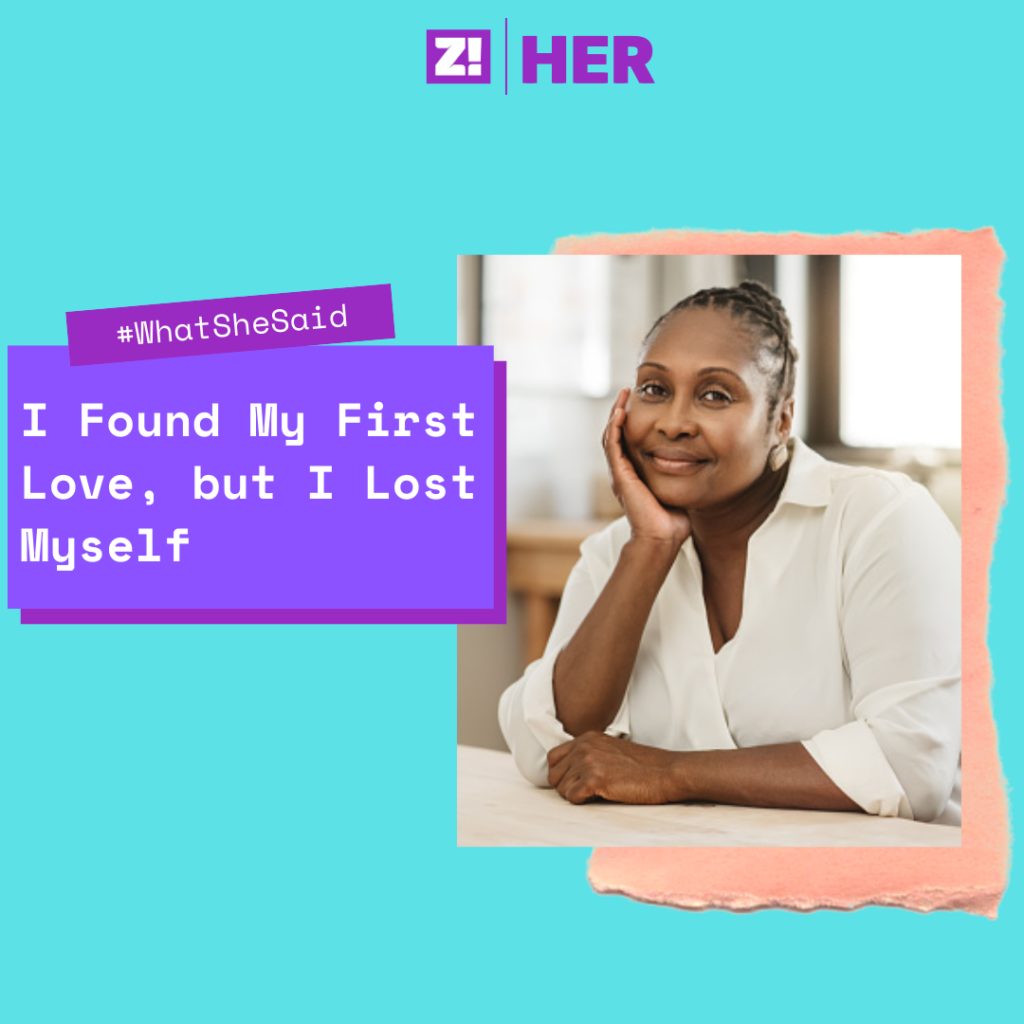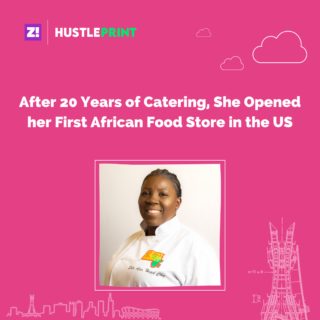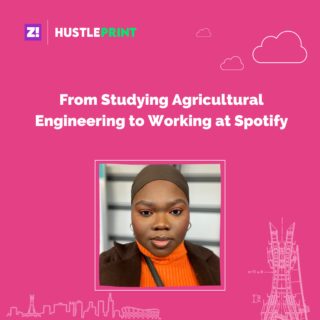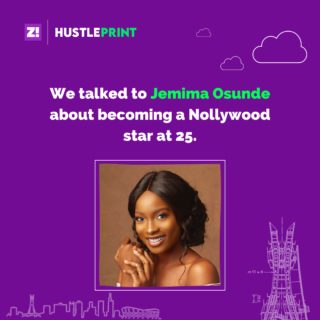Navigating life as a woman in the world today is interesting. From Nigeria to Timbuktu, it’ll amaze you how similar all our experiences are. Every Wednesday, women the world over will share their experiences on everything from sex to politics right here. This is Zikoko’s What She Said.

Today’s #ZikokoWhatSheSaid subject is Joy Ashiedu, a 36-year-old Nigerian woman. She talks about her big-city dreams after moving from Owerri to Lagos, why she married her persistent lover from Facebook and the challenge of living with her in-laws before finding happiness.
What age did you enjoy the most?
Right now. When I was 28, I assumed marrying my first love would somehow make me happy, but after the first year and a half together, the bliss ended. I spent a lot of years fighting to fix things. Everything was about not ending up in a marriage like my parents. I eventually realised that was unresolved baggage I was carrying with me. I was fighting with myself.
What do you mean by “fighting with yourself?”
I had expectations of the way my life would turn out by 25. I’d never really anticipated marriage, but I’d hoped for something better than what I experienced growing up in Asaba (in my village, Issele-Mkpitime) with my parents. I’m the last of five children, and my older siblings had moved out of the house before I was even nine. So it was just my parents and I until I was 12. I went to secondary school in a completely different town in Delta.
My parents tried to give me the best with everything they had. My father was a farmer while my mum was a trader. The issue with growing up with them was seeing the problems they had in their marriage. They weren’t friends. Half the time, they weren’t even around because of their work, and when they were home, they barely spoke to each other. If they did speak, it was an argument or a physical fight. I saw my dad beat up my mum several times.
At the time, I didn’t realise how much it weighed on me to see my parents living like enemies. I also didn’t know how much their fights would affect my own marriage. I was only focused on getting out of the village and making something more for myself. But that didn’t happen for a long time.
What did you want?
I always wanted my own business. I loved being on the farm with my parents and siblings as a kid, but I wanted more than the isolating lifestyle of being in our village. I always wanted to end up in Lagos. My eldest brother lived there, so I lived with him for two years while I tried to get into university.
Before 2004, I’d only lived in the south. I moved back and forth between my village and Agbor, Delta for secondary school. In Lagos, there was so much going on, and everyone had some kind of hustle going on.
In 2007, I ended up going to school in Owerri because it was the only place I got admission. I took all the Lagos hustle and wanted to start a business there.
What kind of business exactly?
For someone who didn’t have a lot of money, I went back to the south trying to set up an organisation that taught people on campus to market their skills. On some occasions, I’d take my school fees to buy things they needed and get a commission when I connected them with clients. I really had a passion for personal development.
At some point, I was part of the radio outlet on campus. I’d go in to give talks about personal development and entrepreneurship. I was talking a lot more than I’d done in years. When you’re young, you have many dreams.
I was hoping to be somewhat like Fela Durotoye. I’d seen him give talks and wanted to somehow replicate that. I was on track. I went to school debates, won, and even started an NGO. But when I went for my IT in Lagos, I met my husband, Steve. It was 2012, and we ended up getting married immediately after my NYSC in 2014.
Why?
He was a persistent man. I’d never dated anyone before him because most of the men I met on Facebook didn’t last more than one or two chats. On my way to work, a random message came in from Steve, and we got talking. Before the end of the day, he asked for my number, but I wasn’t interested.
Two days later, a security man showed up in my office to tell me a man named Steve was outside looking for me. I’d updated my internship location on my profile months before, so it wasn’t hard to find me. That caught my attention. I couldn’t say no to that level of interest. I gave him my number.
Beyond the persistence he showed, I was convinced we were meant to be together.
LOL. Because?
Before I went back to Owerri to wrap up school and serve, I broke things off. When I went to work the next day, the bus driver dropped me off at the wrong bus stop. I didn’t know how I’d missed my junction. I stood confused on the roadside, trying to figure out my next move. And you won’t believe who I saw in a taxi that was slowing down in front of me. It was Steve. Of course, he told me to get in, and we got into the groove of talking again.
I was convinced that coincidence meant something. It wasn’t anything spiritual, but I just knew I would give the relationship a try again. The incident gave more room for friendship between us.
By the time I was done with school and preparing for service in Lagos, he proposed. It felt natural. A year later, we got married. I was 28, marrying my best friend and hopeful for my career.
What changed?
Steve got a job in Bayelsa, so we had to move to Asaba for proximity. He’d travel to Bayelsa every two weeks and go back and forth.
He went from being a banker to joining Shell as a contract staff. He was making way more money than I was, so it only made sense to move. Before we moved to Asaba, I tried setting up my youth empowerment program, but life as a graduate in Lagos was different. I was a married woman, so of course, I wasn’t getting any money from my parents. I also wasn’t getting enough from my husband. Eventually, I needed to get a real job.
I applied to several companies but never got any positive feedback. Then I got pregnant in 2015, and I knew owning a business would be easier. I wanted to be home with the kids. My husband didn’t like the idea. He expected me to work a corporate job like when we met. I didn’t know that was important to him, and he obviously didn’t know building a business was always something I wanted to do. It was one of the things we began to argue about down the line.
Our marriage just gradually fell apart. His mother and sister’s daughter moved in, and that’s when things really got worse. It’s not that my husband cheated or I hated my in-laws, but I wasn’t prepared for everything that came with them living with us. And for so long.
What were the expectations you had at first?
I expected that my marriage would be better than my parent’s marriage. I expected my husband to keep being my friend.
And what did you get instead?
Dealing with external people made it difficult to connect. It was only me, and I suddenly had three people on one side. I’d bicker about his sister, and he’d tell me I was being heady and stubborn rather than take my side.
His mother was ill, and I went from learning to take care of a baby to fully caring for her because he was away at work. At some point, he associated my complaints with me being jobless and idle at home. I felt horrible. By 2017, the whole marriage was practically gone. We’d had our second baby, and his family was still living with us in Asaba. I was exhausted from dealing with so many people.
But you seemed quite social in uni, you were running a whole NGO. What was the issue with handling people?
In uni, I was working towards a career. Now, I was just being choked up. I never knew how to handle those kinds of family issues. I didn’t have that kind of people skills, and that’s not something I learnt growing up with parents who argue all the time.
My breaking point was when I had a disagreement with his sister, and he kept taking her side. She forgot to pack my baby’s cloth from the line when it got windy, and I hated seeing them on the ground when I got back from the market. Of course, I shouted at her. He kept going on about how irrelevant it was, and it could wait to be addressed the following day. The next morning came, and he went on with the “you’re overreacting” line. That did it for me.
It may seem insignificant, but I was mad. That’s when I packed my things and took the kids to my parent’s house. I was done.
What happened next?
My father was late by then. My mother asked me to go back because she’d stayed in her marriage despite everything. There was no valid reason to pack out of my husband’s house, so I went back.
The bickering continued. I didn’t have a job, and the business I’d been trying to grow wasn’t working. Nothing was working. I felt lost.
So how did you get to your current point of happiness?
This is the part that’s hard to explain sometimes. In 2019, we had a fight about letting the kids do what they wanted. I always had to be the strict parent, and I went off on him for that.
I walked into the bathroom furious. I needed a shower, and I stood there thinking through how the years had gone by since I moved to Lagos in 2014. It seemed so far away then.
In the middle of all the thoughts, I heard a voice asking, “what if you are the problem”. Call it the Holy Spirit, the universe, my mind or a hallucination. Whatever you consider that type of moment, it happened.
Did you actually feel like the problem?
I never did. And that’s why I took it as a moment of epiphany. I’d always thought my parents’ marriage didn’t affect me, but it did, more than I cared to admit to myself. Maybe I should have taken more time to rethink my first love, but that didn’t matter.
I came into the marriage with expectations based on my parents. That was my baggage, and I blamed my husband for anything that didn’t fit the ideal standard of love I wanted. But loving myself first was more important.
What exactly have you changed about yourself now?
I’ve stopped expecting love from people, without first giving it. And it’s saved me so much stress. I had to pull back from the consistent fights with everyone.
I’d diverted from everything I wanted after uni to building and fixing a marriage. And that’s why it was falling apart. It’s not that my in-laws moved out, or my husband suddenly changed, my happiness is more about where my mindset is at right now.
Which is?
Conditioning my mind to take responsibility. I had a part to play in my marriage falling apart. A lot of people would be happier in life if they’d just accept they’re the issue. I started a blog to share my experience, and I’ve slowly rediscovered the driven entrepreneur I once was.
I’m finally earning my own money again. It’s not a lot, but I’ve gotten writing gigs on the side. It took me eight years to get here. I’m happier thinking that I have something to offer again, and that’s what I’m going to hold on to.
Is there anything besides the money that’s made you happier?
Keeping my marriage together. Steve’s mother still lives with us, but I’m a lot less bothered by that. She’s older and needs the company of her son and grandkids, I understand that now. Even when we have our disagreements, I focus on not getting as upset over those issues. When it comes to my husband, I just take away the things he loves.
He knows if he wants something from me when he’s back from work, he won’t get it until he apologises. I’ve just found better ways to get what I want. It’s entirely in the way I respond to the challenges and people around me that’s changed.
I know my happiness isn’t in the hands of someone else.
If you’d like to be my next subject on #WhatSheSaid, click here to tell us why




